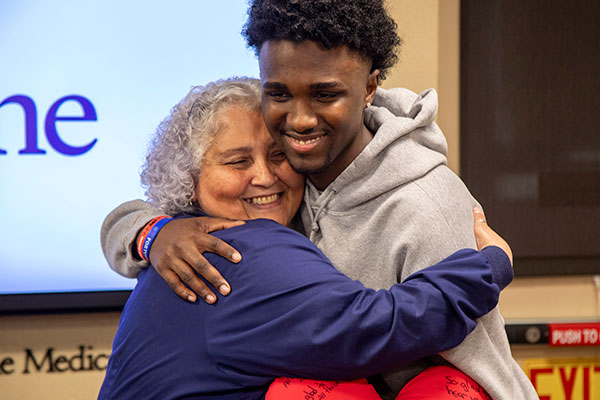
It’s among every parent’s greatest fears—a sudden health emergency threatens the life of their child.
For Gina Gilmore, it couldn’t have been more unexpected when her son Kyle, just 24 years old, came home from work early after having a weird sensation in his chest.
Out of an abundance of caution, Gina decided to take Kyle to Holy Name for an expert opinion, beginning what would quickly become a frantic effort to save his life.
“All I remember is yelling, ‘Save my son… Please save my son!’”
Arriving at the Holy Name Emergency Room, Gina still didn't think what Kyle was experiencing would be anything serious. He was young and healthy, and rarely even came down with a cold. Kyle said he wasn't dizzy or in pain, but still described feeling an odd sense of discomfort. A battery of standard tests produced mostly normal results, but Dr. Andrew Melnyk, the emergency physician reviewing the findings, noticed slightly elevated enzyme levels in Kyle’s blood, potentially indicating inflammation of the heart.
Kyle was immediately admitted to the cardiac unit, where Dr. Stephen Angeli, an interventional cardiologist, diagnosed him with myocarditis, a viral infection causing heart inflammation. Gina was stunned, trying to understand how this was possible and now fearing the worst. Dr. Angeli explained that the infection typically resolves after a few days of medication and rest, but that Kyle should stay at the hospital for closer observation.
Instead of showing signs of improvement, Kyle’s condition gradually worsened. He became severely nauseated and couldn’t keep any food down. His heart enzymes continued to rise, meaning his cardiac function was deteriorating. Then, in the middle of the night, Kyle’s heart beat suddenly sped up and became erratic. The cardiac team started emergency procedures for atrial fibrillation, and called Dr. Angeli, who quickly rushed from his home back to the hospital to help oversee Kyle’s treatment.
Just as Dr. Angeli arrived, Kyle went into cardiac arrest.
Instantly, a team of twenty cardiac specialists flooded the room, administering CPR and prepping a defibrillator to shock Kyle’s heart back into its normal rhythm. One shock. Then another. And another. After six tries, his heart rhythm would not stabilize.
“We were not going to give up on him,” remembers Dr. Angeli. “Kyle had his whole life ahead of him and we had to pull him through this, even if it took every single doctor in that room.”
The Holy Name cardiac team manually performed CPR on Kyle for more than 90 minutes, relieving one another in rotation to be sure blood kept flowing to his brain and other vital organs. Dr. Angeli quickly developed a plan to use a specialized medical device called an Impella pump to bypass the failing left ventricle of Kyle’s heart. He then mobilized a team of cardiovascular specialists to assist with the highly complex implant procedure. It worked. Kyle’s condition stabilized and he slowly regained consciousness.
“I don’t remember much,” Kyle says. “It was the scariest, most painful thing I’ve ever experienced. I kept trying to give the doctors a sign that I was still alive, so they wouldn’t stop trying to save me.”
“And through it all, I can remember someone holding my hand.”
That someone was Toni Whittaker, a Holy Name registered nurse, who stayed by Kyle’s side throughout the frantic effort to save his life.
“Not only did they save his life, but they saved his quality of life,” Gina emphasizes. “I was so close to losing my son, but now I have him back… without any loss of his ability to be a healthy kid again.”
Kyle ultimately spent a month in the hospital before being able to return home, and is now regaining his stamina through regular cardiac rehab sessions at Holy Name.
“Anywhere besides Holy Name– some bigger, impersonal hospital– I dont think Kyle gets the incredible treatment and the level of effort it took to save him,” Gina says. “I am so grateful for Holy Name.”

